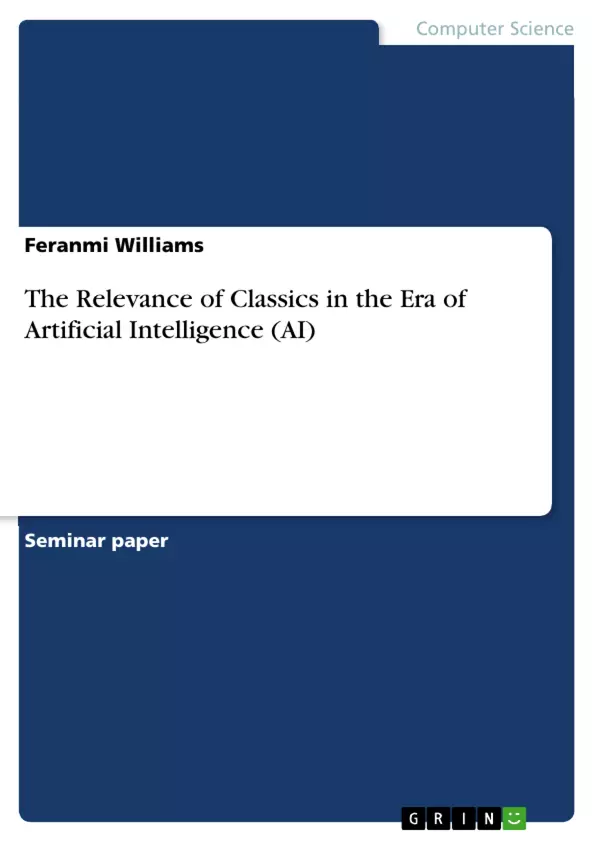This study delves into the enduring relevance of classical studies amidst the rapid advancements in artificial intelligence (AI) technology. It highlights how traditional research offers valuable insights into human nature, morality, and philosophy, essential for ethical reflection and critical thinking in the AI era. By integrating modern AI advancements with classical ideas, the paper emphasizes the importance of classical studies in shaping moral judgment and understanding human interactions with AI devices. Furthermore, it explores how AI impacts traditional research and proposes utilizing AI techniques to enhance ethical and philosophical frameworks, thereby guiding societal implications of technological progress. Through the synthesis of classical wisdom and modern innovation, the study advocates for a comprehensive approach to AI ethics that prioritizes human values.
Inhaltsverzeichnis (Table of Contents)
- Introduction
- The Relevance Of Classics In The Era Of Artificial Intelligence
- Classical Studies: A Historical Perspective
- The Renaissance and The Enlightenment: A Renewed Interest in Classical Studies
- Classical Studies In The Modern Period
- The Rise Of Digital Humanities
- Artificial Intelligence And The Humanities: A New Frontier
- Artificial Intelligence In Classical Studies: Enhancing Research And Interpretation
- Conclusion
Zielsetzung und Themenschwerpunkte (Objectives and Key Themes)
This study investigates the continued relevance of classical studies in the age of rapid artificial intelligence (AI) advancement. It explores how traditional research, rooted in ancient Greek and Roman civilizations, offers valuable insights into human nature, ethics, and philosophy, essential for ethical reflection and critical thinking in the AI era. The study highlights the importance of integrating modern AI advancements with classical ideas to shape moral judgment and understand human interactions with AI devices.
- The enduring relevance of classical studies in the age of AI
- The role of classical research in understanding human nature, ethics, and philosophy
- The importance of integrating classical ideas with modern AI advancements
- The ethical implications of AI development and its impact on society
- The potential of AI to enhance ethical and philosophical frameworks
Zusammenfassung der Kapitel (Chapter Summaries)
- Introduction: This chapter introduces the study's focus on the enduring relevance of classical studies in the age of rapid artificial intelligence (AI) advancements. It emphasizes the importance of classical studies in shaping moral judgment and understanding human interactions with AI devices.
- The Relevance Of Classics In The Era Of Artificial Intelligence: This chapter delves into the transformative impact of AI technology across various sectors and underscores the timeless value of classical studies in navigating the ethical considerations of AI development.
- Classical Studies: A Historical Perspective: This chapter provides a historical overview of classical studies, tracing its origins in ancient Greece and Rome and highlighting its contribution to Western intellectual legacy. It emphasizes the importance of classical studies in fostering an understanding of rhetoric, literature, and moral philosophy.
- The Renaissance and The Enlightenment: A Renewed Interest in Classical Studies: This chapter examines the resurgence of classical studies during the Renaissance and Enlightenment periods, highlighting the renewed interest in the humanities, sciences, and arts. It explores how classical principles of reason, liberty, and progress influenced intellectual and political transformation.
- Classical Studies In The Modern Period: This chapter explores the ongoing relevance of classical studies in contemporary academia and education. It highlights the value of classical writings in providing insights into the human condition, moral quandaries, and timeless issues of ethics and governance.
- The Rise Of Digital Humanities: This chapter introduces the field of digital humanities, emphasizing the transformative impact of digital technologies on classical scholarship. It explores how digital repositories, databases, and mapping initiatives enable researchers to access and study vast amounts of data, promoting collaborative research and interdisciplinary collaboration.
- Artificial Intelligence And The Humanities: A New Frontier: This chapter delves into the rapidly developing field of AI in humanities research, highlighting the potential of AI to enhance research methodologies and provide novel perspectives on the study of literature, history, philosophy, art, and culture.
- Artificial Intelligence In Classical Studies: Enhancing Research And Interpretation: This chapter explores the specific applications of AI in classical studies, focusing on how AI algorithms can enhance text analysis, image recognition, and cultural heritage preservation. It discusses the potential of AI to unlock new insights and interpretations in the study of ancient texts, objects, and cultural phenomena.
Schlüsselwörter (Keywords)
The primary focus of this study is the intersection of classical studies and artificial intelligence (AI). Key themes include the ethical considerations of AI development, the integration of classical wisdom with modern technology, and the potential of AI to enhance research and understanding of human nature, ethics, and philosophy. The study explores the relevance of classical studies in shaping moral judgment and understanding human interactions with AI devices.
- Citation du texte
- Feranmi Williams (Auteur), 2024, The Relevance of Classics in the Era of Artificial Intelligence (AI), Munich, GRIN Verlag, https://www.grin.com/document/1483706



